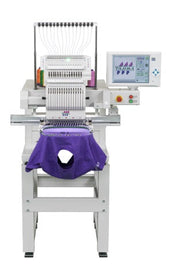Maintaining Your Machine: How Often?
If you, like us, have an affinity for perusing gorgeous, vintage sewing machines in your spare time, you might occasionally appreciate the love and upkeep that comes with preserving such a model. Modern sewing machines are no different. All ages of sewing machines require regular maintenance to ensure longevity and optimal performance. A well-maintained sewing machine is the backbone of any successful sewing project. How often must a modern sewing machine be maintained? We explore all in this expert guide.
Domestic Sewing Machine Maintenance
A domestic sewing machine is a prized possession for crafting enthusiasts and home sewers. The world-famous Juki domestic sewing machines are the most reliable and best-performing machines you can buy but still require a little TLC occasionally. Mostly, an infrequent oil and clean will do the trick but if you want to keep yours in pristine condition, follow these tips.
Cleaning
Aim to clean your machine after every project or every few weeks of use. Dust and lint can accumulate over time, causing the machine to jam and affecting stitch quality.
Oiling
Depending on the manufacturer's guidelines, lubricate your machine's moving parts with sewing machine oil to prevent friction and ensure smooth operation. Check your user manual for specific instructions and be careful not to over-oil.
Needle Replacement
Replace the needle after every 8-10 hours of sewing time or when you notice it becoming dull. A blunt needle can cause snags and uneven stitching.
Bobbin Care
Clean the bobbin area regularly and wind bobbins evenly to prevent thread tension issues.
Belt Inspection
Check the belt for signs of wear and tear. If you notice any cracks or stretching, replace it promptly to maintain consistent power transmission.
Industrial Sewing Machines Maintenance
Industrial machines are workhorses, handling heavy-duty projects with precision. These machines require more meticulous maintenance due to their higher usage and specialised mechanisms.
Daily Cleaning
Industrial machines should be cleaned daily to remove dust, debris, and accumulated thread fibres. A clean machine ensures optimal performance and prevents downtime.
Lubrication Schedule
Follow the manufacturer's recommended lubrication schedule. Industrial machines have intricate parts that require regular oiling to function smoothly under heavy workloads.
Needle and Bobbin Maintenance
Similar to domestic machines, replace needles and clean bobbins regularly. However, due to the intense usage, industrial machines may require more frequent changes.
Tension Adjustment
Check and calibrate thread tension regularly to avoid uneven stitching and thread breakage.
Professional Servicing
While domestic machines can benefit from DIY maintenance, industrial machines should be professionally serviced at least once a year. Skilled technicians from Sewingtime can identify and address any potential issues before they escalate.
Contact us today to find out more about our range of sewing machines.



